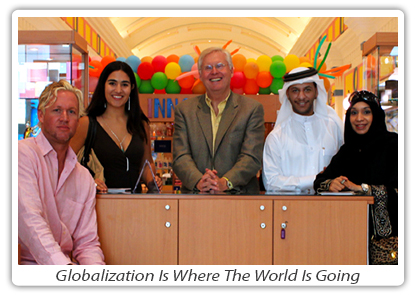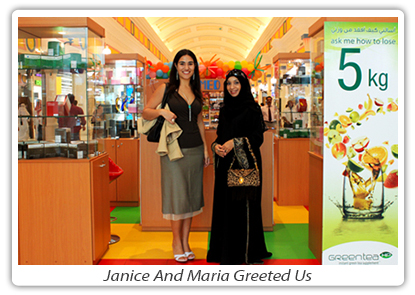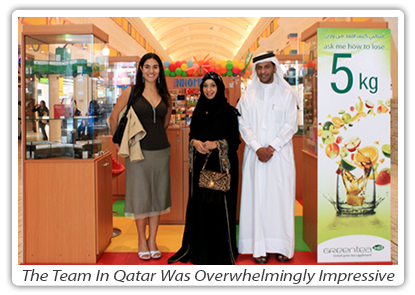
Our company (grënx) does business in the desert capital of Doha. Doha is a city that is situated along the coast of the Persian Gulf. It is the largest city in the oil rich country of Qatar. Last November my son, wife, and I decided to visit two women to whom we had sold a license to sell our product (GreenTeaHP) in one of the large malls in Doha.
As we drove up to the mall, the two women were standing outside waiting for us. A man was with them. One of the two females was wearing an abaya (traditional Arab clothing for women that covers their entire body except for their face and hands), while the other was wearing a short sleeved blouse, a skirt that came just above the knee and fairly high heels. The man was wearing a white desert robe (thoub), keffiyah (head covering) and agal (black chord), that encircles his head to secure his keffiyah.

As we stepped out of the car to meet them, they greeted us in normal fashion, much as would happen in America.
The two women spoke perfect English. One’s name was Janice, the other’s was Maria. “Those don’t sound like Arab names”, I said. Janice, who was wearing the abaya stated, “We’re not, we’re Mexicans”. Maria then said she was born in Mexico City and completed her education at The University of Kentucky. Janice attended the University of Arizona, where she met her husband, as she pointed to him. She said his name is Ahmed, and he is Arab and was born in Qatar.
By this time we had started walking into the mall. I fell back behind the group to catch a moment to try and understand what I had just heard. Maria then fell back and asked, “Roger, do you have any questions?”
“Yes, how is it you’re in Qatar?”
She explained that her husband is Mexican and that he is a pilot for Qatar Airlines. She explains there is a Mexican “colony” in Doha where many of the husbands are pilots. And, that Janice and Maria met at the Mexican Association in Doha, and that the Qatari government is encouraging women to own their own businesses. So Janice and Maria decided to partner and start a business based on retailing GreenTeaHP.
By this time we had caught up with the rest of the group and I asked Janice why she was wearing an abaya. She said that she had converted to Islam and though it is not mandatory that she wear an abaya, she wanted to. She also told us that her mother had converted to Islam and also wears the abaya. “Oh, yes. I’m Mexican but I was born in Arizona”.
By this time Ahmed, her husband, was standing next to me. He too spoke English. He told me that while attending the University of Arizona he worked in the concession booths selling hot dogs and pizza at football games. Then I thought I heard him say that after he returned to Qatar he worked with oil equipment. “Oh, are you an engineer?” I asked.
“No”, he replied with noticeable surprise coming over his face, “I hire them.”
“Oh, you’re in human resources?” I asked again.
“No, I own the company,” was his reply.
I tried not to act too shocked, but thought to myself, “This is one of those oil barons of the Middle East. Oh my gosh, what do I say now?” It’s at moments like these that I can be really dangerous. Almost anything is capable of coming out of my mouth. This time was no exception.
“I suppose you have to accompany your wife when she manages the kiosk?” I asked in an awkward tone.
“No”, was his response, with a noticeable tone of incredulity in his voice.

“You mean she comes and goes as she pleases?” I asked.
“As she pleases,” was his matter of fact reply.
“Even to the States?” was my next question.
At this moment Ahmed started to laugh, and finally put an end to the questioning by stating, “the media isn’t always able to tell a full story. Yes, even to the States. Especially to the States. That’s where her family lives.”
I need to pause here, summarize a bit, and ask the reader a question.
First for the summary. There I was, talking with an Arab Oil baron, who sold hot dogs and pizzas at U of A football games; who met and married a Mexican American fellow student, who in turn converted to Islam, and is running a GreenTeaHP business in the gorgeous Arab coastal city of Doha with her Mexican girlfriend who looks like she came out of Vogue Magazine, whose husband is Mexican but is a pilot for Qatar Airlines.
Now for the question. Is there any generalization that can reasonably be made from the above experience I‘ve just shared with you?
I‘ve tried to think of one. This is an experience that’s hard to explain with traditional ways of thinking.
My point? This may be where the world is going. Globalization, most likely, is mixing us up to the point where old cultural classifications are no longer strong enough to keep us consistently separated.
If this is the case, then for a small business person, a tolerance for diversity has to be developed.
Anciently, the most successful business people were those who established relationships by traveling via caravan from city to city, or sailing from port to port. No doubt that is still a formula for success. But, I think there is an additional formula emerging.
Instead of a few traveling from distinct culture to distinct culture, I believe it is now starting to go the other way. The many distinct cultures of the world are now shopping globally to purchase goods and services. For example, Janice and Maria contacted us through the internet and ordered product from us. Then, they got on our website and found out they could open their own retail outlet selling our product. They found us.
This is not an isolated example. It is now occurring consistently with us. It appears that as cultures mix and mingle globally, what matters is not who people are but what they want. This will be the new working model for entrepreneurs in America. Cultural distinctions fade when it comes to consumer choices. No one really knows what an Arab or Mexican wants, not even Arabs and Mexicans. In a wide open world, facilitated by the freedom of global communication, only each person knows, irrespective of cultural or geographic distinctions.
No matter where a person resides, no matter what is worn, what language is spoken, what political or religious tradition is followed, if that person likes what you make or produce, she or he will come shopping. What’s more, when it comes to their consumer needs, they could care less what culture in the world you come from either.
Moral of the story? If you are in business or want to be in business, just meet a need. In a global world, it’s not necessary to make it any more complicated than that.
That’s what many of us in business are learning. It’s folly to create products based on anything more than what a person wants. And if they want it, they’ll come from everywhere on the planet.